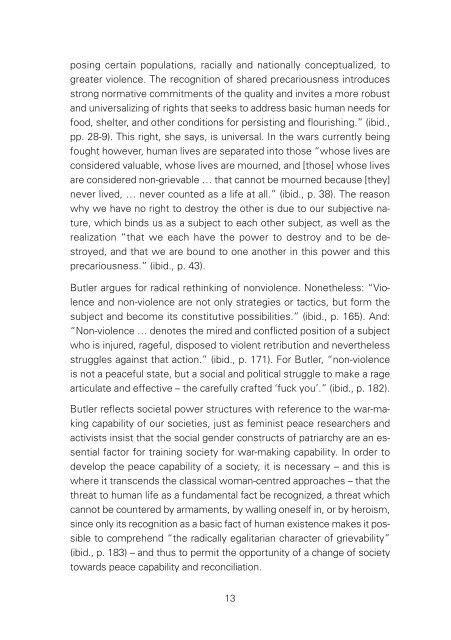The Contribution of Women to Peace and Reconciliation
The Contribution of Women to Peace and Reconciliation
The Contribution of Women to Peace and Reconciliation
Create successful ePaper yourself
Turn your PDF publications into a flip-book with our unique Google optimized e-Paper software.
posing certain populations, racially <strong>and</strong> nationally conceptualized, <strong>to</strong><br />
greater violence. <strong>The</strong> recognition <strong>of</strong> shared precariousness introduces<br />
strong normative commitments <strong>of</strong> the quality <strong>and</strong> invites a more robust<br />
<strong>and</strong> universalizing <strong>of</strong> rights that seeks <strong>to</strong> address basic human needs for<br />
food, shelter, <strong>and</strong> other conditions for persisting <strong>and</strong> flourishing.” (ibid.,<br />
pp. 28-9). This right, she says, is universal. In the wars currently being<br />
fought however, human lives are separated in<strong>to</strong> those “whose lives are<br />
considered valuable, whose lives are mourned, <strong>and</strong> [those] whose lives<br />
are considered non-grievable … that cannot be mourned because [they]<br />
never lived, … never counted as a life at all.” (ibid., p. 38). <strong>The</strong> reason<br />
why we have no right <strong>to</strong> destroy the other is due <strong>to</strong> our subjective nature,<br />
which binds us as a subject <strong>to</strong> each other subject, as well as the<br />
realization “that we each have the power <strong>to</strong> destroy <strong>and</strong> <strong>to</strong> be destroyed,<br />
<strong>and</strong> that we are bound <strong>to</strong> one another in this power <strong>and</strong> this<br />
precariousness.” (ibid., p. 43).<br />
Butler argues for radical rethinking <strong>of</strong> nonviolence. Nonetheless: “Violence<br />
<strong>and</strong> non-violence are not only strategies or tactics, but form the<br />
subject <strong>and</strong> become its constitutive possibilities.” (ibid., p. 165). And:<br />
“Non-violence … denotes the mired <strong>and</strong> conflicted position <strong>of</strong> a subject<br />
who is injured, rageful, disposed <strong>to</strong> violent retribution <strong>and</strong> nevertheless<br />
struggles against that action.” (ibid., p. 171). For Butler, “non-violence<br />
is not a peaceful state, but a social <strong>and</strong> political struggle <strong>to</strong> make a rage<br />
articulate <strong>and</strong> effective – the carefully crafted ‘fuck you’.” (ibid., p. 182).<br />
Butler reflects societal power structures with reference <strong>to</strong> the war-making<br />
capability <strong>of</strong> our societies, just as feminist peace researchers <strong>and</strong><br />
activists insist that the social gender constructs <strong>of</strong> patriarchy are an essential<br />
fac<strong>to</strong>r for training society for war-making capability. In order <strong>to</strong><br />
develop the peace capability <strong>of</strong> a society, it is necessary – <strong>and</strong> this is<br />
where it transcends the classical woman-centred approaches – that the<br />
threat <strong>to</strong> human life as a fundamental fact be recognized, a threat which<br />
cannot be countered by armaments, by walling oneself in, or by heroism,<br />
since only its recognition as a basic fact <strong>of</strong> human existence makes it possible<br />
<strong>to</strong> comprehend “the radically egalitarian character <strong>of</strong> grievability”<br />
(ibid., p. 183) – <strong>and</strong> thus <strong>to</strong> permit the opportunity <strong>of</strong> a change <strong>of</strong> society<br />
<strong>to</strong>wards peace capability <strong>and</strong> reconciliation.<br />
13








